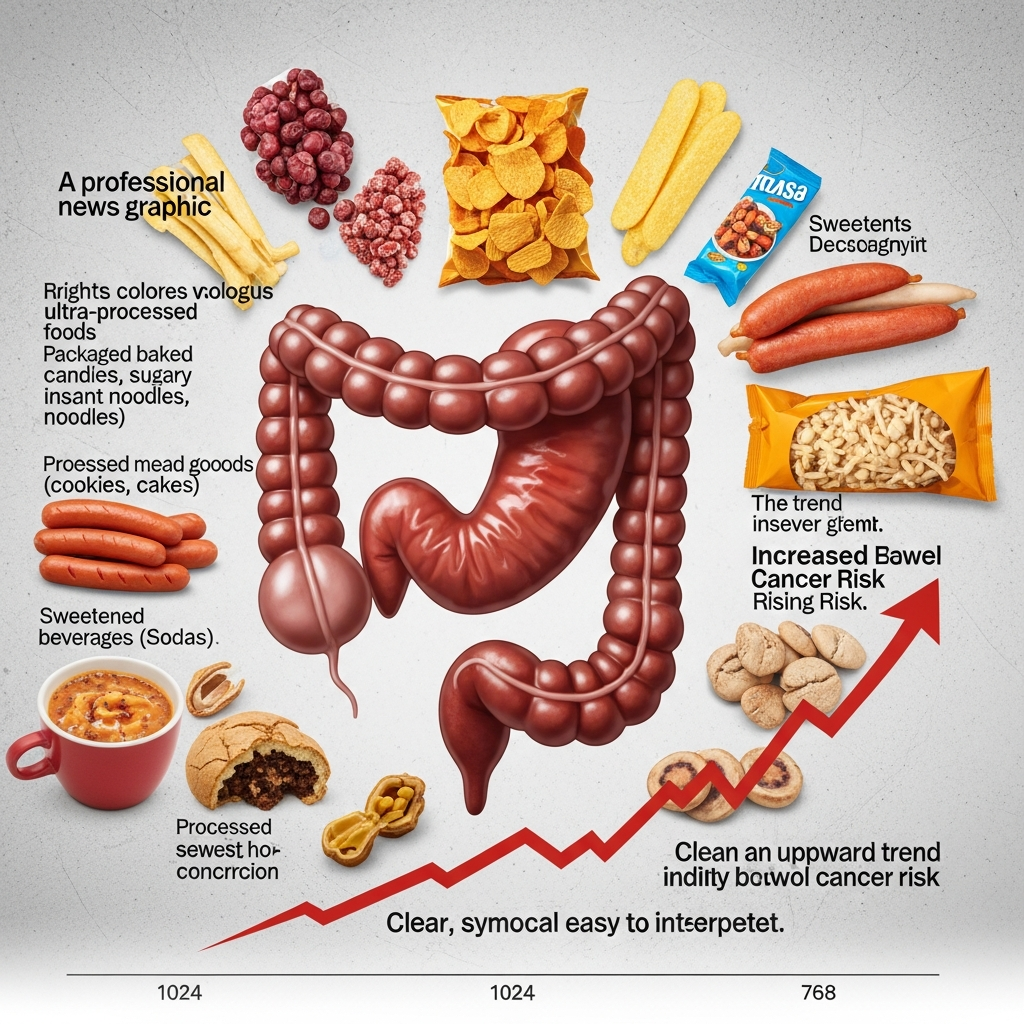A groundbreaking new study has revealed a concerning link between regular consumption of ultra-processed foods (UPFs) and a significantly increased risk of developing precancerous growths in the bowel. These growths, known as adenomas, are often silent precursors to colorectal cancer. This critical research sheds light on why early-onset bowel cancer rates are alarmingly on the rise, particularly among younger adults, and underscores the profound impact of our modern diet on long-term health.
What Are Ultra-Processed Foods (UPFs)?
Ultra-processed foods are industrial formulations made primarily from substances extracted from foods, rather than whole foods themselves. They often contain a multitude of additives, flavorings, emulsifiers, and artificial ingredients. These items are designed to be convenient, highly palatable, and have a long shelf life, making them staples in many modern diets.
Defining UPFs and Common Examples
Identifying ultra-processed foods can sometimes be tricky. Dr. Céline Gounder, a CBS News medical contributor, offers a simple rule of thumb: “If you can’t pronounce an ingredient on the package, it is probably an ultra-processed food.” They typically involve minimal whole food components and extensive industrial processing.
Common examples of ultra-processed foods include:
Sweetened breakfast cereals
Packaged baked goods (muffins, cookies, cakes)
Processed meats (sausages, hot dogs, deli meats)
Crisps and other savory snacks
Ready meals and frozen pizzas
Sugary drinks and flavored yogurts
Certain sauces, spreads, and condiments high in sugar or artificial ingredients
According to a Centers for Disease Control and Prevention (CDC) report, UPFs make up more than half of the average American’s daily diet. This high prevalence is a major concern for public health, especially given their established links to various chronic conditions.
The Startling Study: UPFs and Precancerous Growths
The new research, published in the esteemed journal JAMA Oncology, provides compelling evidence directly linking ultra-processed food intake to precancerous bowel polyps. This extensive study offers invaluable insights into the pathogenesis of colorectal cancer.
Key Findings from the JAMA Oncology Research
Researchers meticulously tracked 29,105 women, with an average age of 45, participating in the Nurses’ Health Study II. Over a 24-year period, from 1991 to 2015, participants regularly completed detailed food surveys every four years and underwent at least one colonoscopy before the age of 50.
The findings were stark:
Women with the highest consumption of ultra-processed foods – averaging approximately 9.9 portions daily – faced a 45% higher likelihood of developing a type of polyp called an adenoma compared to those with the lowest intake (averaging 3.3 servings per day).
A clear “dose-response” relationship was observed: women consuming an average of three UPF servings daily had a 3% risk of precancerous polyps, which jumped to 5% for those eating 10 or more servings.
The study specifically identified diets rich in sugars, artificial sweeteners, and packaged savory snacks as having the strongest association with adenoma development.
This robust research, funded by Cancer Grand Challenges (a joint initiative of Cancer Research UK and the National Cancer Institute in the US), highlights the “important role of UPFs in early-onset colorectal tumorigenesis.”
The Link to Adenomas: A Critical Precursor
Adenomas are non-cancerous growths that develop in the lining of the colon or rectum. While not cancerous initially, they are considered precancerous because they have the potential to transform into malignant tumors over time. The Cleveland Clinic notes that a significant majority—approximately 75%—of all colorectal cancers originate from these types of growths. Identifying factors that contribute to their formation, like ultra-processed food consumption, is therefore crucial for prevention efforts.
Why Early-Onset Bowel Cancer Is a Growing Concern
The rise in early-onset bowel cancer (colorectal cancer in individuals under 50) has become a global health mystery. Cancer Research UK (CRUK) reports that incidence rates of bowel cancer among people aged 25-49 have surged by 62% since the early 1990s. This rapid increase points away from solely genetic causes, suggesting that modifiable lifestyle factors, such as diet, are likely playing a significant role.
Dr. Andrew Chan, the study’s lead author from Harvard Medical School, emphasized this trend: “We’re seeing more cases of bowel cancer in younger adults, and we still don’t understand why.” He and his team are actively exploring dietary factors, lack of exercise, and disruptions to the gut microbiome as potential contributors. Dr. Folasade May, a gastroenterologist at UCLA, highlighted that this rapid increase “is likely unfortunately something we have done to ourselves as humans.”
How UPFs Might Harm Your Gut Health
Researchers are actively investigating the precise biological mechanisms through which ultra-processed foods exert their harmful effects on the bowel. Several key hypotheses point to a complex interplay of factors that can increase cancer risk.
Gut Microbiome Disruption
Our gut is home to trillions of bacteria, collectively known as the gut microbiome, which play a vital role in digestion, immunity, and overall health. Ultra-processed foods often lack fiber and essential nutrients while being high in sugars and unhealthy fats. This composition can drastically alter the balance of gut bacteria, favoring harmful strains over beneficial ones. A disrupted microbiome can lead to chronic inflammation and compromise the integrity of the gut lining, making it more susceptible to cancerous changes.
Inflammation and Permeability
The additives and high levels of unhealthy ingredients in UPFs can trigger a low-grade, chronic inflammatory response in the gut. Persistent inflammation is a known risk factor for various cancers, as it can damage healthy cells and promote uncontrolled cell growth. Furthermore, UPFs may increase gut permeability, sometimes referred to as “leaky gut,” allowing toxins and bacteria to pass into the bloodstream, thereby exacerbating systemic inflammation and impairing the colon’s ability to repair itself.
Metabolic Impact
Ultra-processed food consumption is strongly associated with an elevated risk of obesity and Type 2 diabetes. Both conditions are well-established risk factors for colorectal cancer. The high sugar content in UPFs can lead to insulin resistance, creating an environment that promotes cell proliferation and tumor growth. Dr. Marc Siegel commented that cancer precursors are linked to “disarray of metabolism, especially when accompanied by inflammatory chemicals.”
Beyond Polyps: The Broader Health Risks of UPFs
The link between ultra-processed foods and precancerous polyps is just one piece of a larger health puzzle. Accumulating evidence consistently ties high UPF intake to a wide array of other serious health problems, reinforcing the need for dietary improvement.
These include:
Cardiovascular disease: Increased risk of heart attacks and strokes.
Type 2 diabetes: Due to high sugar content and impact on insulin sensitivity.
Obesity: Often calorie-dense and lacking in satiety-inducing nutrients.
Sleep disturbances: Poor diet can negatively affect sleep quality.
Depression: Emerging research suggests a link between UPFs and mental health.
Increased mortality risk: Studies have shown a higher risk of early death among high UPF consumers.
Participants in the JAMA Oncology study who consumed more ultra-processed foods also typically exhibited higher body mass indexes (BMIs), were more likely to have a history of smoking, engaged in lower levels of physical activity, and consumed fewer essential nutrients like fiber and Vitamin D. These correlations further highlight the comprehensive negative impact of ultra-processed diets.
Taking Action: Reducing UPFs for Better Health
While dietary choices are often shaped by external factors like food prices, marketing, and local availability, empowering individuals with knowledge and practical strategies to reduce ultra-processed food intake is crucial.
Practical Tips for Healthier Eating
Making conscious shifts away from UPFs can significantly improve your overall health and potentially lower your risk of conditions like bowel cancer. Here are some actionable steps:
- Prioritize Whole Foods: Focus your diet on fresh fruits, vegetables, whole grains, lean proteins, and healthy fats. Cook more meals from scratch, as this gives you control over ingredients.
- Read Labels Carefully: Be wary of long ingredient lists with unfamiliar names, artificial colors, flavors, or sweeteners. Opt for products with minimal ingredients you recognize.
- Plan Meals and Snacks: Preparation is key. Having healthy options readily available can help you avoid convenient, ultra-processed choices when hunger strikes.
- Limit Sugary Drinks: Replace sodas, energy drinks, and sweetened juices with water, unsweetened tea, or sparkling water with a slice of fruit.
- Be Mindful of Condiments: Many sauces and dressings are high in hidden sugars and additives. Consider making your own or choosing healthier, low-sugar alternatives.
- Seek Out Fiber: Increase your intake of fiber-rich foods like legumes, nuts, seeds, and whole grains, which support gut health.
Fiona Osgun, head of health information at Cancer Research UK, wisely noted that “Our overall diet matters more for cancer risk than any single food type.” Focusing on a balanced, whole-food-based diet is the most effective strategy.
The Role of Food Policy and Public Health
Individual action, while vital, must be supported by broader systemic changes. Experts like Osgun advocate for:
Food policy reforms: To make healthier food options more accessible and affordable.
Public health initiatives: To educate communities and promote healthier eating habits.
Regulation of marketing: Especially targeting children with UPFs.
These wider changes are essential to create an environment where healthy choices are not just possible, but also easy for everyone.
Frequently Asked Questions
What are ultra-processed foods, and why are they linked to early bowel cancer risk?
Ultra-processed foods (UPFs) are industrial food formulations made primarily from processed substances rather than whole ingredients, often containing artificial additives. A recent JAMA Oncology study found that women with high UPF intake (around 9.9 portions daily) had a 45% higher risk of developing adenomas—precancerous growths that often lead to colorectal cancer. UPFs are believed to increase risk by disrupting the gut microbiome, causing inflammation, increasing gut permeability, and contributing to obesity and Type 2 diabetes, all established cancer risk factors.
How can I identify ultra-processed foods in my daily diet?
To identify ultra-processed foods, look for long ingredient lists with unfamiliar chemical names, artificial colors, flavors, or sweeteners. Think of foods designed for maximum convenience and palatability. Common examples include sweetened breakfast cereals, processed meats, packaged snacks like crisps, ready meals, sugary drinks, and many sauces or condiments. Dr. Céline Gounder suggests if you “can’t pronounce an ingredient on the package,” it’s likely a UPF.
What practical steps can I take to reduce my ultra-processed food consumption?
Reducing UPF consumption involves prioritizing whole foods, cooking more meals from scratch, and carefully reading food labels. Focus on fresh fruits, vegetables, whole grains, and lean proteins. Plan your meals and snacks in advance to avoid convenient UPF choices. Opt for water or unsweetened beverages instead of sugary drinks, and consider making your own sauces. Increasing fiber intake from natural sources also supports gut health and overall well-being.
Conclusion
The evidence from the JAMA Oncology* study is a powerful wake-up call regarding the health implications of ultra-processed foods, particularly their connection to early-onset bowel cancer. As incidence rates for this deadly disease climb among younger populations, understanding and modifying dietary habits becomes paramount. By recognizing what ultra-processed foods are, how they impact our bodies, and making conscious choices to embrace a whole-food-based diet, we can collectively work towards mitigating these significant health risks. Consult with your healthcare provider for personalized dietary advice and cancer screening recommendations.




